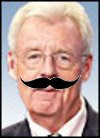The scouting reports and the college stats said that, out of these two center fielders, Wheeler could actually wind up playing CF at the big-league level (Jackson was questionable) and had plus speed.
Jackson looked like he was just an OK player next to this guy.
Well, that was a couple of years ago. What have these two done in pro ball since then?
Brace Yourselves...It's not Good
Brett Jackson may be our best prospect, but his numbers pale in comparison to what Tim Wheeler has done.
Tim Wheeler
Brett Jackson
What do you see? I'll tell you what I see: one guy that does everything pretty well and another guy that does a couple of things really, really well.
Jackson looks like he can hit for average (this year not so much), but he has some speed, some power, and even though you can't see it here, he can play good defense.
Wheeler had a couple mediocre seasons in the minors but this year has blown up. At Double-A, he's shattered this image of a speed guy with no pop. He has 26 HRs in 90 games for a ridiculous .611 slugging percentage. He's hitting .300 for the first time as a pro, is getting on base at a healthy .382 clip, and even has 15 steals to boot (though he's been caught 9 times).
Was I right about Jackson? Should the Cubs have drafted Wheeler?
On the first question, no. I was wrong about both of these guys. Jackson is better than I thought and Wheeler is an enigma. I thought he was going to be a speed guy playing a good CF, and that is being put to the test this season. If he keeps hitting home runs at even a reduced rate than he is now, then the Cubs are going to regret this pick.
Jackson looks like he'll be a good ball player, but so far he hasn't shown that he can come up and be a star. Wheeler is on the same patch, but this season is pretty hard to ignore...it's pretty sick.
This is why I try to be as gently as I can when I rip the Cubs (or any other organization) for making horrible decisions picking players. It's a crap shoot. Unless you're talking about once-in-a-lifetime talent then there's no telling what might happen as players climb through the minors.
It's one of the things that makes baseball so different than any other sport: the difference between the college ranks and the pros is so wide that it's impossible to tell how a player from one level will do at the next.






